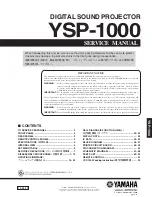
Connections
23
Eng
lish
Connecting S-Video source devices
Examine your Video source device to determine if it has an unused S-Video output socket
available:
•
If so, you can continue with this procedure.
•
If not, you will need to reassess which method you can use to connect to the device.
To connect the projector to an S-Video source device:
1.
Take an S-Video cable and connect one end to the S-Video output socket of the Video
source device.
2.
Connect the other end of the S-Video cable to the S-VIDEO socket on the projector.
To connect the projector to an Audio source device:
1.
Take a suitable audio cable and connect one end to the AUDIO OUT jack of the AV
device. Connect the other end of the cable to the AUDIO IN jack on the projector.
Once connected, the audio can be controlled by the projector On-Screen Display
(OSD) menus. See
"Adjusting the sound" on page 42
for details.
The final connection path should be like that shown in the following diagram:
•
If the selected video image is not displayed after the projector is turned on and the correct
video source has been selected, check that the Video source device is turned on and
operating correctly. Also check that the signal cables have been connected correctly.
•
If you have already made a Component Video connection between the projector and this
S-Video source device using Component Video connections, you need not connect to this
device using an S-Video connection as this makes an unnecessary second connection of
poorer picture quality. See
"Connecting Video source devices" on page 20
for details.
S-VIDEO
VIDEO
HDMI-1
HDMI-2
COMPUTER
PC
RS-232
USB
AUDIO
OUT
IN
L AUDIO R
COMPONENT
AV device
Audio Cable
S-Video Cable
















































